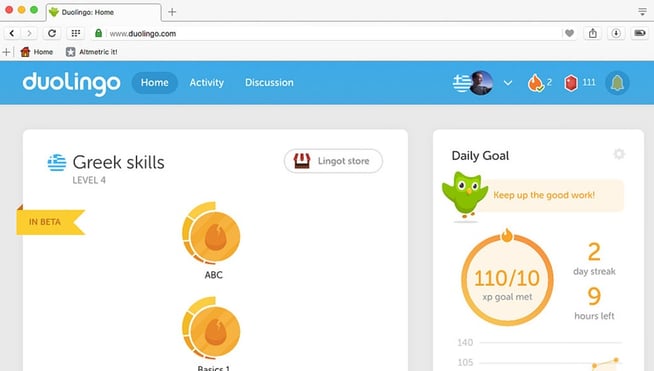So, you’ve decided to take the leap and intern abroad. Congratulations! Surely you are excited and probably have a few worries too. One of the most common fears in going abroad is facing the dreaded language barrier.
What happens if no one understands you? What if you get lost because you can’t read the signs or accidentally get an order of raw slugs after misreading the menu? It happens!
Language barriers can be challenging so you are bound to run into a few sticky situations, and not just from gelato on warm days. While there is no way to completely avoid this, there are several ways to make it easier on yourself, and to cope when it’s not so easy.
Prepare before you go

“Do something today that your future self will thank you for.” - Sean Patrick Flanery
When I first came to live in Italy my Italian language skills were close to zero. As a busy girl finishing my last semester of college and graduating less than a week before crossing the pond, I put it off and admittedly didn’t really take the time necessary to prepare by learning some basics. In my first weeks here, when people asked if I spoke any Italian, I jokingly replied that I could say “Pizza per favore” and what more did I need?
However, despite what the movies lead you to believe, there is a bit more to life in Italy than indulging in pizza. Needless to say, when it came time for real day-to-day interactions, I wished I had buckled down and studied up a bit. Learning to communicate in a brand new language can seem more than a little intimidating, especially if like many lucky enough to have English as a first language, you have never had to rely on another language.
Don’t freak out! While it can take many years to become fluent in a new language, just knowing the basics can have a huge impact on life when you arrive in your new country when you intern abroad. There’s a level of comfort and confidence that comes with being able to apologize when you bump into someone, ask where the bathroom is when you’ve gotta go, or let your fellow commuters know you need to get off the metro on your commute without pushing them out of your way.

Luckily, there are several great options to learn the basics from home before jetting off to your new city. One of the easiest of these is available at the tap of a finger. That’s right, if you open the app store in your phone and search for language learning apps, it heeds hundreds of results. The most popular is Duolingo. Duolingo offers a fun, friendly, and free approach to learning your choice of 23 available languages.
The app tracks daily progress, and advances your level as you go. If you’re into a more social learning experience, consider joining a local beginners course or searching for a language exchange meetup in your home city. It doesn’t matter how you do it, only that you do. Investing a bit of time in knowing a few basic phrases will give you the confidence you need for a successful, low-stress start in your new locale.
Fail fast

“Anyone who has never made a mistake has never tried anything new.” - Albert Einstein
Now here’s the tricky part… You did better than I did and practiced before getting on the plane, but upon landing you realize there’s a bit of a difference between talking to the Duolingo owl in the privacy of your bedroom, and speaking with real people.
At first this can feel very intimidating and that can make it tempting to revert to English or shy away from using the language. After all, who wants the embarrassment of pronouncing something totally weird, using the wrong word, or clamming up and going all deer in the headlights on the person you’re trying to speak to?
It’s human nature to not want to bring any embarrassment or unwanted attention on yourself. Using your new language requires a huge amount of vulnerability and bravery. It will be embarrassing. It will be awkward and stressful and frustrating sometimes.
But be vulnerable, try it, fail fast, and learn from it. The sooner and more often you embarrass yourself and fail at your new language, the sooner you’ll get comfortable with the speaking situations you run into on a daily basis. Although it can be unnerving, with some time, this has the power to eliminate a lot of anxiety from your life abroad.
Learn from the locals

“Language is the roadmap of a culture. It tells you where its people come from and where they are going.” - Rita Mae Brown
Once you’ve arrived and tried out the “please,” “thank you,” and “excuse me,” you prepared for from home, it’s likely you’ll want to continue expanding your vocabulary in order to get more comfortable in the new culture that is all around you. That’s great! While language apps and other digital resources are still a good resource to utilize, don’t be afraid to take advantage of the unique opportunity you have to learn from the ones who really know what they’re talking about, the locals.
If your program includes a language course, that’s a great place to start. Learning from a native speaker allows you to hear the language in its true form, begin to adjust to hearing the accent of your area, and learn some of the nuances and funny little things which can be difficult to appreciate from afar. When the course finishes, if you’re still hungry to learn more, try setting up a regular language exchange with a local.
This can be an awesome, and free, way to continue learning while building relationships in your new community. Look for Facebook groups or meetups targeted towards these types of interactions. Lucky for you, English practice is in high demand and in many international cities you can find limitless potential friends to exchange languages with.
Another great way to utilize the locals is by simply listening to them. Pay attention to conversations when you’re at the office or out in public. As a beginner it can be especially fun with conversations between parents and young children, as they tend to be less complex and use simpler vocabulary. Try to listen for words or phrases you hear frequently. You will likely pick up on some common phrases and maybe even local slang. If you don’t understand what it means, ask someone or look it up online.
Be a human

“Everyone smiles in the same language.” - George Carlin
When you do run into challenges communicating, remember that everyone you speak to is human too. While the response you get to your communication struggles can vary from place to place, most people are very understanding, helpful, and appreciative of your effort. It can definitely feel really frustrating to not be understood, but try not to get discouraged too easily.
If you do run into communication roadblocks, remember that speaking isn’t the only way to get your point across. Use hand signals or body language, draw a picture, type it into a translator, get creative. Although it probably isn’t your favorite way to communicate and might feel a little silly, it is completely okay to do these things, and most people you encounter will be receptive and helpful.
Challenge yourself
“It’s not about perfect. It’s about effort. And when you bring that effort every single day, that’s where transformation happens. That’s how change occurs.” - Jillian Michaels
Chances are, you speak with your manager in English, you speak with your GE roommates in English, and your Netflix language preference is set to English. It’s totally understandable to want the comfort of your own language when you can get away with it. After all, a lot of your day is spent struggling to communicate and understand everything going on around you. By the time you get home at night, your brain hurts.
While there’s no shame in that game, if increasing your language skills is at the top of your list of goals, make an effort to challenge yourself during your free time as well. Try having small conversations with co-workers, experience familiar shows and movies in a different way by watching them in your new language, or get a magazine or graphic novel and work your way through it using pictures for context and a translator app to help with unknown words. This extra push outside of your comfort zone definitely takes discipline, but will pay off with big gains in your language skills.
G’day mate

“A little nonsense now and then, is relished by the wisest men.” - Roald Dahl
Don’t go off like a frog in a sock! That’s Pants. No clue what I’m talking about? If your program is in an English-speaking country, you may be thinking language language barriers are a non-issue for you. Think again. While it’s true that you definitely have an easier task than those learning a brand new language, encountering unfamiliar dialects and accents in other English-speaking countries could have you feeling as though people are speaking to you in Chinese.
In places where you might be interning abroad like England, Ireland, and Australia, though English is the primary spoken language, the small differences from the unique dialects and vernacular can cause big confusion. To prepare yourself, do some research before you go. This way you can impress the locals, or at least be able to keep up with what they’re saying.
Of course there will still be many times you’re chatting with your co-workers and find yourself with your head-tilted to one side wondering whose dog you’re talking about and what it's dinner has to do with your colleague’s presentation. In cases like these, don’t be afraid to ask or do a little research on your own.
You have this!
In reality, everyone picks up on new languages at their own pace, and not everyone values devoting time to developing language skills. Anyway you slice it, it’s okay! Regardless of your preparation or commitment, I can promise you three things: The first is that the language barrier will cause you some problems; The second is that you will find a way anyway, if not always in the easiest, cheapest, fastest, or smartest way; the third is that by the end of your program, you will be able to look back and laugh at the you you were just a few short months ago, appreciating how much your communication skills have developed.
Most of all, I want you to remember that by taking the leap to live in a new country with a new language, you have made the choice to take yourself out of your comfort zone. This comes with many challenges: language, life, laundry…for some of us; but facing these challenges allows you to grow and become a more agile, empathetic, and worldly person. This is something to be so proud of and excited for! So study up…or don’t, and get ready to knock down the barriers.






















